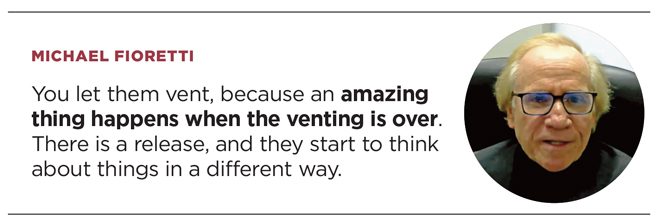presented by
Couples who decide to divorce enter into a period of time where many, many more decisions will have to be made – important, difficult and life-altering decisions. How you choose to work through those defined changes can make all the difference in the world. Will it be through family law mediation? Or will you head straight to litigation? We asked South Jersey family law mediators to tell us what we should know when choosing between the two.
Participants:
Hon. Marie Lihotz (ret.) Archer & Greiner
Michael Weinberg Weinberg, Kaplan & Smith
Michael Fioretti Law Offices of Michael D. Fioretti
Meghan Bradley DeLorenzo Bradley & Banfe
Roseann Vanella Advanced Mediation Solutions
Nicole Donoian-Pody Charny Karpousis Altieri & Donoian
Bruce Matez Weir Law
The difference between traditional divorce & mediation
The difference is like night and day. Traditionally, divorces were handled in court and decisions were made by judges. In mediation, the decisions are made by the couple themselves as to what’s best for them and their family. They don’t have to rely on what a judge might think is best.
Bruce Matez
In a courtroom, people either represent themselves or they have attorneys who represent them. They present issues to the judge, and the judge then makes a determination, and whatever that determination is, that’s the end of the story. In mediation, it’s really a people-driven process. The parties who want to resolve a dispute are there to see if they can work out the disagreements. If they come up with a resolution, then that is the final determination.
Hon. Marie Lihotz
If you go into litigation, that’s a huge retainer you have to put down to get that lawyer to represent you. And the ironic part of the whole thing is, in South Jersey, at some point of those proceedings, you end up with a mediator. So why not start with the mediator and a review attorney rather than a litigation attorney?
Michael Fioretti
I don’t call it traditional divorce anymore, because really, people are choosing to mediate a lot more. I call it the old-fashioned divorce, which is when couples each hire an attorney, and the attorneys negotiate between them. There is no direct conversation between the parties who are divorcing. In mediation, they’re coming together and asking a neutral third party – a mediator – to guide them through the process so they’re making the decisions.
Roseann Vanella
Mediation is now part of the traditional divorce in some capacity or another. The family court system in New Jersey requires mediation to try to resolve the issues in dispute before a judge decides them through a trial.
Michael Weinberg
There are many differences between a traditional divorce process and mediation. The most important is the control spouses retain over the outcome. In mediation, the spouses come up with their own answers to the issues, rather than enabling a third-party judge to impose those decisions on them.
Meghan Bradley
What a mediator does
The mediator’s role is not to say this is what you should do – that’s not what mediation is about. The mediator tries to get the parties to come to a resolution together.
Nicole Donoian-Pody
A mediator guides the couple through the process. They educate the couple. The mediator is in charge of the process. And the couple is in charge of the final decision.
Roseann Vanella
Qualities of a good mediator
You have to be a people person. You have to be able to read people’s body language to see where they are. I was a Vietnamese-speaking interrogator during the Vietnam War. I was taught to look at body language and pick up things. I’m very good at reading people immediately. When you’re able to do that, you can find out where someone really wants to end up. Because the real question is: Where do you want to be when this case is over?
Michael Fioretti
There are tons of qualities that make a mediator effective. The most important is having active listening skills. A mediator also needs to be able to set aside their own personal feelings about a particular issue and help the couple work toward a resolution that has absolutely nothing to do with what the mediator might think.
Bruce Matez
A mediator needs to be calm, patient and to ask a lot of questions, because the more information a mediator can draw from the spouses, the easier it will be for the spouses to come up with resolutions to the problems.
Meghan Bradley
A mediator needs to be experienced in all areas of divorce: custody issues, spousal support, equitable distribution and other financial matters. A mediator also needs to be a compassionate person, because you’re dealing with people at one of the hardest times in their lives.
Roseann Vanella
How to know your best interests will be considered
Communication is key. Make sure your goals are properly defined, and that you articulate what your concerns are. Negotiate for yourself. If you aren’t comfortable doing that, you might want to consider having an attorney accompany you to mediation. You can meet privately with the attorney, express your concerns and desires, and let the attorney assist through the mediation process.
Michael Weinberg
Understand what your rights are, so when you are in mediation you understand what you’re negotiating. You want to be educated so you know what your options are.
Nicole Donoian-Pody
Setting forth your position is important, and much of that does rest with the mediator. The mediator’s job is to make sure the process is balanced, that there isn’t one party trying to impose their will on the other party. If there is that imbalance, the mediator has to adjust. If one person can’t talk or feels intimidated, the mediation won’t work.
Hon. Marie Lihotz
I always tell my couples the number-one thing I look after is the best interest of the family. If somebody really wants someone who will look after their best interests, they can hire an attorney to use as a legal consultant. We advise clients to each hire a separate attorney to review the final agreement to make sure that agreement is in their best interest.
Roseann Vanella
Before mediation, have a consultation with an attorney who understands family law in New Jersey and in the general geographical area where you live. Sometimes there are subtle differences between how things are done in Camden, Gloucester and Burlington counties versus how they’re done in Hudson and Essex counties. Make sure you have a good understanding of your legal rights and obligations.
Bruce Matez
A divorce is a fifth-grade math problem with complications. That’s all it is. People’s emotions are what make it complicated. I’ve found when I am involved in a mediation and these two people are killing each other – other than physical abuse – you let them vent, because an amazing thing happens when the venting is over. There is a release, and they start to think about things in a different way.
Michael Fioretti
Mediation Mistakes
One of the mistakes I see clients make is to assume that I, as the mediator, will take a side and make a decision for them. So they try to convince me of the wisdom of their point of view. I remind clients I’m not the judge, I’m not making a decision, and that’s good news for them because they’re making the decisions.
Meghan Bradley
Someone might go into litigation thinking they’re going to get what they want. That’s not how divorce works, whether you go to trial or mediation. Divorce isn’t designed to give one person everything they want. It just doesn’t happen that way.
Nicole Donoian-Pody
The biggest mistake I see is an unwillingness or an inability to let go of the past. When you come into mediation, if you’re angry because there was infidelity or because of the way things happened in your marriage, that doesn’t help you focus on how to solve problems moving forward. Identify the problem and look for a common solution, but if you want to harp back to what happened in the past, that will hinder your ability to move forward.
Michael Weinberg
A mistake a client could make is not being informed. Knowledge is important. If you’re in a mediation process and you have questions you feel aren’t being answered, you have the right to a review attorney. You can tell the review attorney what you’re discussing in mediation and what you don’t understand. They can give input. Transparency is essential.
Michael Fioretti
Sometimes clients, or sometimes their attorney, think they’re in front of a jury in a courtroom. So they’re trying to argue their best position, as opposed to having a discussion about how we can resolve the process. It’s a mindset more than anything else. If we can get people thinking along the lines of, “We want to see if we can solve the problems,” then we will be much more successful.
Hon. Marie Lihotz
When mediation might not work
Private mediation is totally voluntary, so if you know your spouse is unwilling to communicate, mediation will be difficult. And of course, if there are any issues of abuse, that’s not a time when couples should be in mediation.
Roseann Vanella
Spouses who are very controlling and think they’re going to control the process – not a good candidate. Spouses who tend to abuse the other – not a good candidate. And some spouses don’t want to be in mediation, because they really don’t want to be divorced. But you can talk with them. Tell them you know this is something they never thought would happen to them, but the alternative to mediation is not good. This is what’s best.
Michael Fioretti
Mediation won’t work for somebody who thinks, “I want a, b and c, and I’m going to get that,” and when they’re not hearing what they want to hear, they walk out. That person isn’t ready for mediation. It doesn’t mean mediation won’t work eventually. It may be too soon. They may be more open to the process after some time passes.
Nicole Donoian-Pody
When there is an inequality of bargaining power, that can be a difficulty. If you have one spouse who has been a stay-at-home parent for 20 years, and another spouse who is a hard-driving professional, that might be a difficult circumstance for the stay-at-home spouse because of the dynamic of their relationship. That person might want to consider bringing an attorney with them to mediation.
Michael Weinberg
I don’t often see signs that spouses can’t work together in mediation, but there are those circumstances where it becomes evident that there is uncontrolled anger, there may have been domestic violence or maybe the threat of domestic violence going forward. When spouses are not on an equal footing, mediation may not work.
Meghan Bradley
There are two really important principles for anyone entering into mediation. One is candor. If people are not going to actually talk about what’s most important to them, that will impede the process. The second is they really have to appear in good faith. They can’t hold back important information. The objective in mediation is to get through all the issues in a fair process.
Hon. Marie Lihotz
There are programs in New Jersey now where people who have domestic violence restraining orders can mediate their divorces. There’s controversy around this, because a victim of domestic violence can feel like they’re being taken advantage of in mediation. But there has been a lot of discussion about the victim feeling re-victimized by the legal system, because of the coercive control somebody can put on them while litigating a divorce. A mediator who handles this type of mediation should be specially trained. There are certain protocols to make sure they’re not allowing the perpetrator of violence to continue to victimize the victim.
Bruce Matez
How to ensure a successful mediation
Be honest. If the issue is support, be honest about your income. You can’t have a secret bank account. You can’t have assets you don’t disclose or assets you’ve moved to somebody else’s name. Be candid about all of that, knowing it will come out if the matter goes to trial. And if it comes out in a courtroom, that’s a lot more disastrous. If a judge thinks you were holding back information, that can really hurt a case.
Hon. Marie Lihotz
Spouses should prepare by identifying their assets, their liabilities, their incomes, their spending plans. The more information they can gather in advance, the more effective the time we spend together will be. What a spouse should not do is dig into positions and come into mediation with one idea of what they want to happen. Try to be open to a world of options.
Meghan Bradley
Be willing to compromise. Be creative in your thinking and decision-making.
Bruce Matez
Be willing to give and take. Don’t be intimidated by the process. If you go into mediation with a defined set of goals and you’re unwilling to modify what you want, well, you’re probably not going to have a successful result.
Michael Weinberg
Make sure you’re using a trained mediator. In New Jersey, mediators go through a 40-hour training course, and then there’s follow-up training. Also, make sure you provide the mediator with all the information that the mediator needs, like financial information. And be willing to compromise and negotiate to reach a resolution.
Nicole Donoian-Pody
Child custody & parenting time
In New Jersey, there are two types of custody: legal custody and physical custody. Legal custody is almost always shared by the parents, where they both have input into major life decisions for a child. Physical custody is where the children primarily reside. Are they going to live with both parents on a 50/50 basis or primarily with one parent? Physical custody will then trigger the parenting schedule. Parenting time used to be known as visitation, but the thinking is parents shouldn’t “visit” with their children. They should have parenting time.
Michael Weinberg
This is the most difficult part of the case. If I’m dealing with money, it’s very easy to move assets around. But when you start talking about the welfare of your children, and how much time you’re not going to spend with your children, then it gets tough. In many cases, one parent thinks they’re the better parent and they don’t want their children to be away from them for significant periods of time. But today, most of these cases end in 50/50 custody.
Michael Fioretti
There is no assumption that the mother or the father should have most of the time with the child. Sometimes spouses will come into mediation thinking that’s the way things ought to be. I ask the spouses how they foresee their future, living separately and spending time with the children. I begin a conversation about how they might best be able to share time in a way that will work for both of them, because if both of them are happy, the children will be happy.
Meghan Bradley
It’s interesting. A lot of times you hear “opposites attract,” and all the ways the other party was different from you, you loved. Now you’re in two separate households, and they don’t do things the way you do, particularly when it comes to the children – and that ends up being the biggest disagreement. Trying to iron out those kind of disagreements takes a lot of time. People have to be willing to let go and recognize that kids are resilient. They can adjust, as long as the parents stop fighting. That’s really, really important: If the parents stop fighting, the kids will flourish.
Hon. Marie Lihotz
The parenting time schedule is unique to each family. Most couples now are looking to share equal time. But sometimes schedules just don’t allow for that, so there’s a lot of creative things that can be done. In mediation, we take a lot of time in deciding parenting schedules and parenting issues.
Roseann Vanella
In mediation, the parents decide all parenting issues. And these are decisions adults should make. Parents can hear what their kids have to say, but ultimately, parents need to make those decisions. If your child comes to you and says, “I’m not going to school anymore,” are you going to say ok? We shouldn’t let kids at any age make decisions about things that will impact them for the rest of their lives.
Bruce Matez
Dividing assets
New Jersey is a state that adopts a concept called equitable distribution, and you’ll often hear judges say equitable doesn’t mean equal. Well, sometimes it does. Many times, it does not. But in mediation, people can decide whatever they want. I’ve had people say, “I’m willing to give up this excluded asset if I get something else,” so it’s a bargain situation. You don’t have to follow the law, and mediators can come up with resolutions that judges could never, ever order.
Hon. Marie Lihotz
New Jersey is not a community property state, so there is not an automatic 50/50 division. Once we understand the makeup and value of the assets, then we can figure out how they’re going to be divided based upon the facts, the statute and case law. Eventually a property settlement agreement is drafted, which contains details of how the assets will be divided.
Nicole Donoian-Pody
In mediation, couples have to disclose everything – all assets and all debts. Depending upon that financial picture and what life needs to look like for them, we kind of take the pieces of the puzzle and put them together in a way that will set them up for success in the future. Mediation clients are free to make whatever decisions they want to make, as long as they both agree.
Roseann Vanella
Before, you sold the house, you split the proceeds, and you bought another house. You can’t do that now. Housing values have inflated drastically. But in mediation, you can do different things with regard to housing. For example, yesterday, I talked to people where the mother is going to stay in the house in Haddonfield until her daughter graduates high school, which is four years away. That wouldn’t happen in court. The house is the biggest asset of that family, a judge would order that house be sold and the assets divided.
Michael Fioretti
Once we have the assets and liabilities and their actual values identified, we look at it on a spreadsheet and say, “Ok, so this is what you have. Who wants what?” We can trade off assets. We can sell assets. We can buy each other out of assets, but first we have to identify them and value them.
Meghan Bradley
To effectuate equitable distribution, you engage in a three-step process. The first step is you identify the assets and the liabilities. Second step is you value the asset, and the third step is you distribute the asset. Some assets are self-valuing: If I have a savings account, I can tell you it has $100,000. But if there’s a house and one party wants to keep the house, and the parties can’t agree upon a value, I might hire an expert to appraise the house for purposes of equitable distribution.
Michael Weinberg
Questions to ask when looking for a mediator
Ask if they are a facilitative mediator or a directive mediator. Some mediators are more prone to suggesting how issues should be resolved. Other mediators are more facilitative and ask clients to come up with their solutions, with the assistance of the mediator.
Meghan Bradley
Ask if the mediator is a trained mediator, and if they’ve taken the courses that are required by New Jersey. Also ask how long they’ve been doing mediations.
Nicole Donoian-Pody
Whether you’re choosing a divorce attorney or a mediator, the fit is key. You want to be sure that person will listen to you and take your feelings into consideration and help you through the process. You may just need to sit across from the person and feel if this is someone you jive with – or don’t.
Michael Weinberg
Ask about their experience. A lot of people whose cases I mediate are impressed that I was a lawyer 15 or 20 years before they were born, and their parents didn’t even know each other at that time. Reputation also counts. Most of the cases I mediate are referrals from other people I mediated or practicing lawyers.
Michael Fioretti
There are different kinds of mediators. Some mediators do what I would call directive mediation, which is basically, “Tell me your problem, I’ll tell you the answer.” That’s a simplistic way of putting it, but those mediators push to the result by expressing their opinion. A facilitative mediator has the parties talk it through, mostly by asking questions: Would you consider what was just expressed by the other side? The kind of mediator you choose makes a difference. You have to decide what you want and then choose the person who best fits that.
Hon. Marie Lihotz
Ask about their process. Some of my colleagues use very specific formulas – I don’t. I tailor my process to my clients’ needs.
Bruce Matez
What surprises people about mediation
People are sometimes surprised that I might ask an accountant to assist me when I’m doing a mediation. When people are married, typically they’re going to withhold their taxes based upon being married. When you get divorced and that status changes, the amount you bring home in your paycheck will change. So if you’re going to try to calculate alimony, it’s helpful to understand what each party will have left in their check once they’re divorced. If you just look at the paycheck when they’re married and use that number to calculate alimony, it’s not really accurate.
Nicole Donoian-Pody
I make people happy, and I help them find peace. As a mediator, we can have significant impact on what the future looks like for people. I’ll often say to people, “Do you want to have a relationship where, when your kid graduates from high school, you’re on opposite sides of the gym because you hate each other? And where does your kid go to take pictures? Does your kid come to you first, or do they go to the other parents first?” Those are the kind of horrible stories we hear all the time. Who needs all that anger and hatred. I can’t imagine living like that.
Bruce Matez
People think my work is adversarial and ugly, but that’s not true. Couples who self-select to come to mediation are not difficult. They’re people who find themselves in this stressful situation. But it’s a pretty calm process. We’re working together to create a positive life for them and their kids after divorce.
Roseann Vanella
Advice if you’re about to begin mediation
Be calm, be candid and be communicative.
Hon. Marie Lihotz
Preparation for the mediation process is key. Do your homework.
Michael Weinberg
You might feel like somebody took your life, put it in a pillowcase, turned it over, shook it and it’s falling out all around you. But try to be calm.
Nicole Donoian-Pody





















